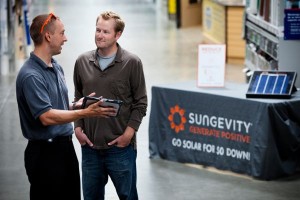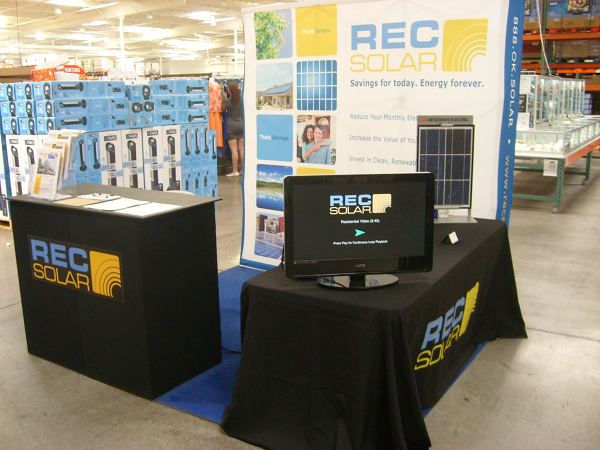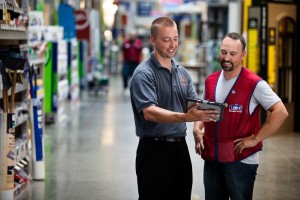Partnering with big box stores allows solar installers to increase job prospects.
By Charles W. Thurston
National big box retailers like Costco, Lowe’s and Home Depot can drive up deal volume for solar installers lucky enough to be able to co-market at store sites, but only a handful of players seem to be locking up most of the business in many of the biggest solar states. Opportunities still exist, however, in moving into untapped regions, in forging strategic partnerships with regional or local hardware or home improvement chains and in forming relationships with other energy service vendors.
Perhaps the oldest relationship between a big-box retail store and a solar company is that of REC Solar and Costco, now about a decade long. “We are probably in about 150 Costco stores now,” says Ethan Miller, general manager of REC Solar’s regional business.

SOLAR HOME IMPROVEMENT
A Sungevity salesman educates a Lowe’s customer about solar inside a store. Sungevity has been working with Lowe’s stores across multiple states since 2011. Photo courtesy of Sungevity.
“The value of the retail partner is that the consumer wants a more mainstream solar buying experience, so add the demographics and the credibility of both sides and it provides a great avenue to acquire leads and customers,” Miller continues. “The consumer feels like you had to go through some vetting process to even stand in the store; that’s got to help your close ratios.”
For Costco, “We need a solar installer we can trust to expose our 70 million customers to [and] who also guarantees to save customers money,” says one Costco employee who asked not to be further identified. “We also want a company that will be around in five years if warranty issues come up. In return, we take back a very, very small referral fee.”
Another relatively early mover in this marketing channel was Oakland-based Sungevity, which aligned itself with Lowe’s in May 2011 for an eight-state program to offer residential solar packages. At the time, Lowe’s national network included 1,750 locations and a customer flow of 15 million per week; the agreement then covered states where Sungevity had operations, including Arizona, California, Colorado, Delaware, Maryland, Massachusetts, New Jersey and New York. Today, Sungevity is also in Connecticut, Australia and the Netherlands. As one element of the deal, Lowe’s took an undisclosed equity share in Sungevity. To finance its sales, Sungevity has taken on venture capital partners. Lowe’s declined to comment on the relationship.
“Our Sungevity RSAs (retail solar advisors) assist the stores in selling solar, train Lowe’s associates on the Sungevity process, help qualify customers and create events to drive awareness of the program,” says Liz Ludwig, Sungevity’s vice president of marketing. “A strong percentage of our Lowe’s customers come directly from Lowe’s associates.”
In a similar relationship, the nationwide installer/leaser SolarCity partnered with Home Depot, beginning in the Western region. SolarCity, now a publicly-traded company, finances its own sales through corporate fundraising.

GROCERIES, APPAREL AND SOLAR
It might seem odd to have a solar display by the clothing section, but REC Solar says being in Costco stores — no matter what section — has provided more opportunities to consumers wanting a mainstream solar buying experience.
Home Depot also partners with a New England regional installer, Roof Diagnostics of Wall Township, N.J., which has expanded rapidly after initiating sales at the chain, according to Kelcy Pegler Jr., company co-founder. His company began its Home Depot relationship in a pilot program in 14 New Jersey stores, thanks to lease financing partner SunRun. Now Roof Diagnostics plans to be in 175 stores by the end of the year — in Connecticut, Massachusetts, New Jersey, New York and Pennsylvania.
“A good store generates $1 million in solar sales,” Pegler says. “We haven’t necessarily reduced our marketing costs per sale since we started in Home Depot, but the sheer volume means that almost the same processing team — for customer closing, permitting, design, utility coordination, etc. — that was handling 30 projects a month now can do 130.” Home Depot declined to comment on the relationships.
All these installers operate manned kiosks inside or outside the store and also encourage store employees to recommend their services. All acknowledge that the store reputation enhances their product acceptance by the customer. Once the sale is made, some installers use their own employees to do the installations while others subcontract the job.
“Sungevity supports local businesses by partnering with the very best local installers in our customers’ communities,” says Ludwig. Rapid expansion has led them to raid other solar companies for employees at times.

SELLING PARTNERS
Sungevity says that a strong percentage of its Lowe’s customers come directly from Lowe’s associates spreading the word about the advantages of solar. Photo courtesy of Sungevity.
Yet other installers, like SolarCraft of Novato, Calif., have strategically opted to pursue opportunities closer to home, tying up with smaller regional hardware chains, like Friedman’s Home Improvement in California. SolarCraft, which also works with SunRun for lease financing, also employed manned and unmanned kiosks in the three-store chain. And some installers are partnering with individual hardware stores, like SolarWorks of Cottonwood, Ariz., which set up marketing at a local Ace Hardware.
At least one hardware store began its own solar division, selling systems in the store and sub-contracting the installations out to local contractors. Hassett Hardware’s Palo Alto branch in California started out installing a few panels on its own building in 2000. Within two years, it had sold $3 million worth of residential solar systems. While the extra sales were promising, the company has since given up its side business in solar, in part because a member of the family-owned business retired. But Hassett Hardware’s success proves that solar can find success even at the smallest hardware store.
“Smaller installers should play to their local area and not try to reach out to the likes of Home Depot because that is a different scale of operation,” says Carter Lavin, business development director at Solar Marketing Group in San Francisco. “Your value proposition is the same as your local hardware store.”
Whether it’s on a large scale or small, going where the jobs are makes sense to any business owner. In the case of solar installers, working with big box stores opens the door to new potential customers.
Charles W. Thurston is a freelance writer who covers solar energy from Northern California. Reach him at chazwt@gmail.com.
— Solar Builder magazine
[source: http://www.solarbuildermag.com/featured/box-stores-solar-partners/]

Leave a Reply
You must be logged in to post a comment.